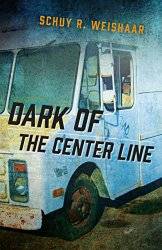For the most part, I have always enjoyed books that are provocative and a little bit, shall we say, off-kilter. Books that make you think and question, even if that questioning’s been prompted by at times strange subject matter. However I believe to have strange subject matter then it needs to have some sort of purpose, or if the intended idea is communicate some type of message to the reader then that message needs to be clear, otherwise the novel risks failing to make sense in its entirety and leaving the reader wondering what they missed along the way. Schuy R. Weishaar’s novel Dark of the Center Line, while at times thought-provoking and with moments of interesting language, generally left me feeling like I would need to read it a couple of more times before I got a grasp of what was on the page.
So before I move on to why I thought it was a provocative, if confusing novel, let me first give you a quick overview of the plot. Dark of the Center Line begins with a conversation between a father and his son talking about the differences between light and dark, and what the Universe was like before, well, anything existed. It’s an interesting conversation, yet, and this is how I felt for the majority of the book, I had trouble connecting it to the rest of novel. Many of the passages or individual chapters were interesting within themselves, but it was when I tried to read the book as a cohesive whole that I had some difficulty.
From then on we’re permanently set in a small town in Illinois, though we’re never told specifically where. The remainder of the novel centers on Abraham, who was born a child prodigy and whose main “gift” is to read, recite, and eventually act out “entire chapters, sometimes entire books, of holy writ” (14). It’s about here that you know religion and spirituality are going to play a dominant role — which I have no objection to — but the novel felt like an odd mixture of religious questioning in the middle of a murder-mystery, and neither of the two were able to resolve each other.
Abraham then works as a bible performer in “The Young Rabbi” and “The Dyslexic Jew”, randomly disappears, has a family and later abandons them as well. He re-establishes his acting ties with his past manager Saul and three dwarves and they travel around performing “Great Tales from the Bible”. However Saul had recently been diagnosed with a recurring cancer, and soon after the traveling Bible group is brought to an end. While up to this part I’d been puzzled by the different narratives, it’s after Abraham stops working as a Bible Story performer and stays with the dwarves Eco, Grotto, and No-No that the rest of the novel skyrockets on the strange level. In one night Eco and No-No are murdered, as well as a mentally-disabled girl Barbie Meadows, and Abraham is soon the prime suspect. The novel ends with the discovery that Barbie’s father killed Eco and No-No because he believes that they and Abraham killed Barbie, which we never discover is true or not. Abraham is later brutally murdered and tied to a cross after his death for his supposed role in Barbie’s death, closing the novel.
So if this were solely a murder-mystery novel or about exploring the tenets of faith, then I think this novel could have worked better. And even as I appreciated the off-kilter approach, only at its simplest form did the plot make sense to me, so the additions of flashbacks and outside musings, though interesting in themselves, didn’t really help me understand the story. The way the novel closely follows various symbolism and stories from the Bible is again intriguing when taken as a separate unit, but I never felt it quite worked with the other storylines. The combination of religion and culture struggled to blend together as a whole which left me feeling like I was missing out on something important to the novel.
The characters also never resonated with me, with Abraham the most difficult character to grasp. I was never sure if I was supposed to like him because, similar to Jesus, he could perform miraculous deeds or if I found him appalling for his periods of immense cruelty, which at one point included strangling his son’s hamster to death because his son had burned some old pictures, then abusing his wife and abandoning them immediately after. The remaining characters had little development or depth, and at times some of them felt superfluous to the story. I think if some of them had been removed it would have helped clear up some of the clutter and given more focus to the central characters and their stories.
I would be remiss though if I didn’t mention the times where I found arresting language that explored the point where every person’s past and present come together, and the struggle to find any meaning or sense in it. As Abraham is riding his bicycle after an earlier interview he “thought about beginnings, how this sojourn, this interruption … had begun to seem like the beginning of something, the end of something, but also a premonition of what was coming … He would crucify time itself, pin it down in the intersection of past and future, and get to the bottom of whatever the hell the world had in store for him” (72). This passage was one of the many times I thought Weishaar eloquently described the inherent passage and struggle with time that we all grapple with, and gave needed moments of humanization for otherwise un-relatable characters.
Unfortunately, I would not recommend this book for anyone looking for some light-hearted reading to pass the time. If you’re a fan of murder-mysteries or books with unusual religious and spiritual musings, then you might be able to find more enjoyment out of this than I did. However beyond the occasional thought-provoking language I don’t see much hope for this novel ending up on my bookshelf.
Schuy R. Weishaar is also the author of Masters of the Grotesque: The Cinema of Tim Burton, Terry Gilliam, the Coen Brothers, and David Lynch. He currently teaches writing and literature.
About Meghan McCoy…
Meghan is currently a Sophomore undergraduate studying English at the University of Illinois Urbana-Champaign. When she’s not writing for Smile Politely she’s most likely off reading, baking, or doing more writing for her English classes.









 About Meghan McCoy…
About Meghan McCoy…